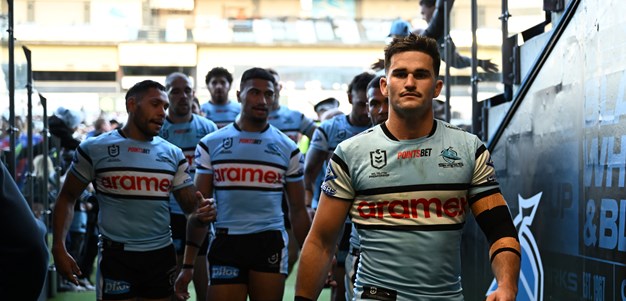
The next generation of elite referees are being equipped to withstand the intense pressures of the profession through NRL Community programs for the first time.
Talented Match Official squads in NSW and Queensland have participated in State of Mind and Voice Against Violence sessions in the past two weeks.
Having now been running for three years, the Talented Match Official program was revamped this season to focus more on the personal development of the "third-tier" whistleblowers.
"It's making sure they get a greater self-awareness," said ex-NRL referee and state transitional coach NSW, Alan Shortall.
"Because I think at the end of the day they'll become better referees and hopefully better people.
"When the team go and officiate with their state-based squads they get their technical officiating [training], but when they come and see us they get a bit of personal wellbeing."
Shortall, who refereed more than 200 NRL games between 2008-18, believes the emphasis on mental health will be particularly beneficial for the referees in what is often a hostile climate.
"Very similar to a player, we have all those little challenges going on inside our head," said Shortall, who added he wished there was more mental health education when he was an NRL match official.

"A little bit of understanding about resilience will help - how we bounce back from a bad performance or an example where we make the right decision but we've got all that external noise.
"Hopefully the Talented Match Official team can take something away from that. They're growing in their development and hopefully one or two of them make the NRL."
Rising ref Luke Saldern, who controlled this season's SG Ball under-18s grand final and won the NSWRL Junior Representative Referee of the Year award, said that even at junior rep level there is an expectation of excellence.
"You invest a lot of time and late night trainings and time away from home, so you want to see the results from that," said Saldern, who has been elevated to the NSWRL grade squad.
"You do feel the pressure. When players are out there investing just as much time as you, they expect you to perform as well.

"I think [State of Mind] is really good. Around the refereeing space there's a lot of negative attention.
"I think it's really good to take a positive outlook on things and probably ramp up our awareness around mental health and try to create a more positive environment."
Meanwhile, the delivery of Voice Against Violence to the referees continued the NRL's commitment to educating people so they can help drive social change.
"We're showing the community the NRL has a strong stance on violence against women and children and that we're strongly against it," said Voice Against Violence program deliverer Emily Latu.
"I'm really proud to work for a game that is advocating for this change."
NRL Officiating is supported in the delivery of various programs by Western Sydney University (NSW) and Griffith University (Queensland).


